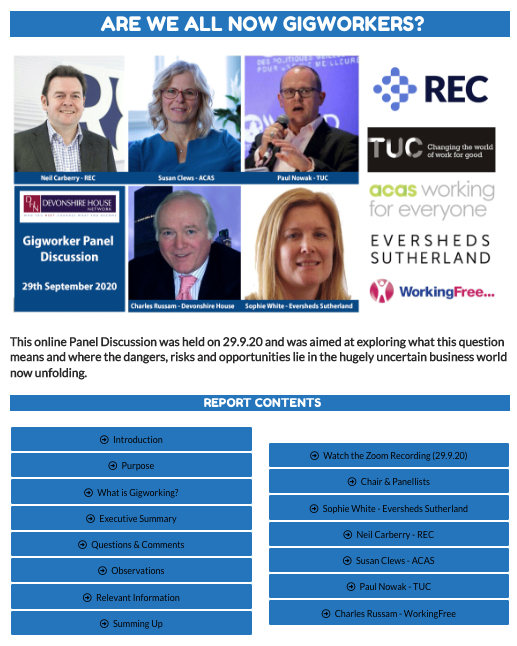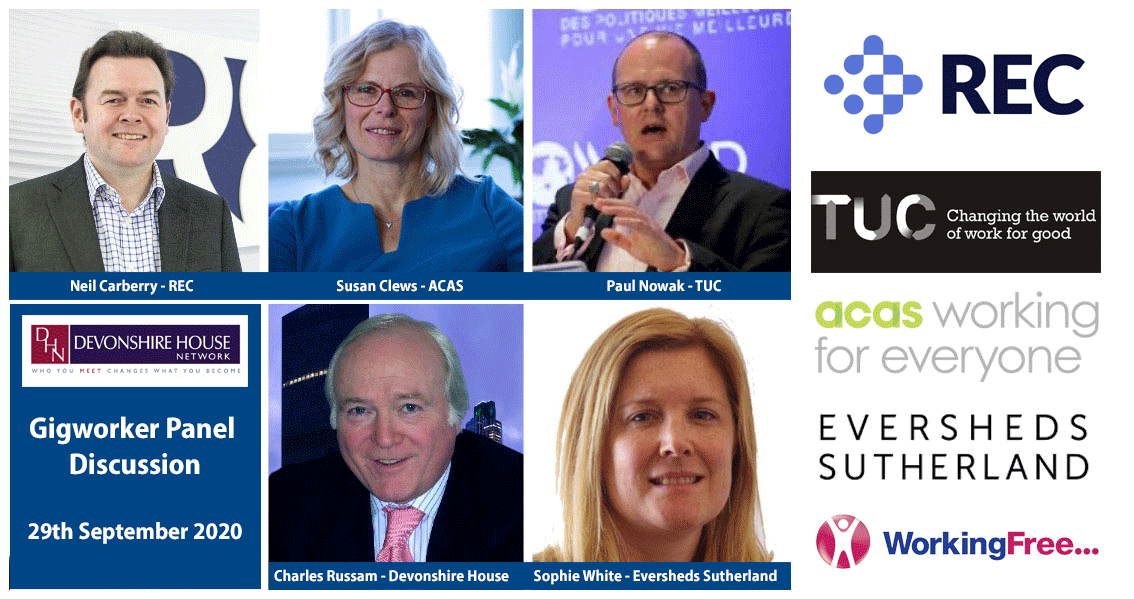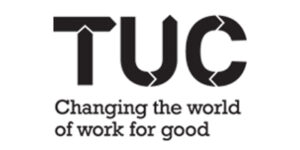
Gigworker Report
ARE WE ALL NOW GIGWORKERS?

This online Panel Discussion was held on 29.9.20 and was aimed at exploring what this question means and where the dangers, risks and opportunities lie in the hugely uncertain business world now unfolding.
REPORT CONTENTS
INTRODUCTION
We are indebted to Sophie White, Partner at Eversheds Sutherland, for so skilfully chairing and contributing to the Event and also to our expert Panellists for so comprehensively covering so many of the key features in the probably unique circumstances of where we currently find ourselves. We were privileged to listen to the collective views from acknowledged leaders in their fields, representing the beating heart of the UK employment sector – and at a critical time when that heartbeat may be a bit irregular. However, what was noticeable was their professional response – let’s understand what is going on and deal with it. There was no negativity. The Panellists were Neil Carberry, CEO, at the REC; Susan Clews, CEO at Acas; and Paul Nowak, Deputy General Secretary at the TUC. Charles Russam, MD at Working Free and Devonshire House Network was the fourth member of the Panel and he also authored this Report – as will be fairly evident to those who read it!
Created and promoted by Devonshire House and driven by The Recruitment and Employment Confederation (REC), the TUC , Eversheds Sutherland and Working Free, this interactive specialist Panel Discussion looked into the significant changes in UK working practices as a way of understanding what the trends are. What are the emerging drivers? Where is it heading? Is it good news or bad news? Are there any calls for action?
The original idea and discussion behind this highly topical Event took place in the late Autumn of last year. We started promoting it in January of this year having fixed the date as 22.4.20. Many thanks to Sophie White of Eversheds Sutherland for offering to host us on this occasion – as they have done on previous occasions.
Covid-19 changed all this – and we re-fixed the date for 29.9.20 taking the view that all would be “back to normal” by then. Alas, not so! Our Event on 29.9.20, therefore, went online.
But what it did enable us to do was examine the dramatic changes -– primarily Covid-19 – that have taken place since we first put this project together. It allowed us to envisage how our working world might change in the months and years to come. The degree of change that has taken place to date is enormous – and is still going on – and will continue. Much of this is evidenced when you compare what we say and write now with what we said and wrote at the beginning of the year.
PANEL DISCUSSION ZOOM RECORDING - 29.9.20
⇑ click  above for video chapters ⇑
above for video chapters ⇑
PURPOSE
The purpose of this online Panel Discussion was to understand the current position and the divide between the different types of work models. Of all the words used – including Typical/ Atypical –and standard way of working – none really fully hits the target – But “Gigworker” is the one that seems to capture the public and broader interest. If we can identify the trends and patterns in our working world, we can identify how we ought to react. We are looking for new insights, new knowledge and new solutions. The relevance of this is heightened by the advent of a new Government (new when we first proposed this Panel Discussion!) keen to do new things, some of which might seem to belong to others’ political dogma and some still treading water until Covid-19 is dealt with.
The purpose is not to be a missionary for Gigworking – nor an apologist. The purpose is to explain what it is, how it relates to other workplace models and to confirm its place in the range of jobs or work options available to all players in the UK workplace – or as much as can be covered in ninety minutes.
WHAT IS GIGWORKING?
Charles Russam offers this description/definition of Gigworker:-
From its supposed original description of itinerant musicians, we interpret the word “Gigworker” in a broad and very modern sense. In real-life terms it probably means all workers other that FTEs (full-time employees – nothing more and nothing less.) I contend – and this is gleaned from the ONS Employment Stats (EMP01)- that it accounts for approaching nearly half of the total UK working population of 33m. Or has done until now.
Gigworkers are those people – at all levels – who need or choose, either wholly or in part, to find their own work, their own “clients” – their own things to do – with their infinitely variable and uncertain levels of reward. They are not – usually – dependant on one employer for their income. They are a varied and mixed group of part-timers, self-employed, contractors, freelancers, Interim Managers, Temps, Consultants, Management Consultants, Semi-retired people, Portfolio Workers, Off-payroll workers, Zero Hours Workers, etc.
Ask EMP01 (part of the ONS Monthly Employment Statistics) how many of the 33m UK working population are wholly full-time employees on the permanent corporate headcount. The answer offered here is 55%. The other 45% are something different. This 45% is a complex mix – comprised as above – changing all the time, bedevilled by problems of definition, interpretation and self-certification. But these ONS figures are the best available – with others getting nowhere near the scale, depth and consistency of the ONS. A better description of these people might be “Self Drive Workers”. It is this 45% that is under scrutiny by this expert Panel. (NOTE: In recent months that has changed to 57%/ 43% – but is likely to revert to the 55%/45%, where it has been for many years.)
This category of worker – from zero-hours contract workers all the way up to Director-level executives operating independently – has included some of the hardest hit during the Covid-19 pandemic – and further uncertainty is challenging organisations as they look at the whole process of people working in their organisations.
NOTE on ONS Employment Statistics – EMP01.
At the time of compiling this Report the latest EMP01 figures available were for August. These have shown some change from previous months – in that the 55%/ 45% split between full time employees (FTEs) have become 57%/ 43%. But there has been no reported change for FTEs – at 21m. We all know that our working world is changing hugely – reflected in the Covid-19 driven difficulties around accuracy and timeliness. For example – F/T and P/T employees on furlough are still included as F/T and P/T.) This figure has varied between zero and 9.4m. When workers come off furlough this will not make any difference to the EMP01 figures – but many will eventually disappear from these statistics as they become ineligible for inclusion – usually because they become redundant. There are other reasons but figures for unemployed come from other sources – DSS and/or HMRC.
This is how the ONS comments on this;-
More information can be found on the link in blue above.
We are grateful to Tony Wilson, Director, Institute for Employment Studies for his valuable and timely comments.

Important and additional data comes from the Institute for Employment Studies.
Read their latest IES Briefing Paper – 13.10.20 – here – Download the paper
They Report
- The official measure of employment has fallen by significantly more than had been previously estimated.
- Overall, employment is down by nearly half a million since the crisis began.
- There are likely to be a further half a million people who were still being counted as employed but were away from their jobs and not being paid.
- The fall in employment appears to have been driven by a large fall in part-time work, which accounts for nearly 90% of the decline.
- Unemployment has risen from 4.1% to 4.5% in the last three months alone.
- Redundancies have risen sharply again this month, doubling on the previous quarter to 230k. This is the highest level since summer 2009 and the fastest rate of growth on record.
- We are forecasting that redundancies will continue to rise sharply through the remainder of the year.
- Overall employment fell by more than we had thought during lockdown, and is now 500k lower than before the crisis.
Tony Wilson writes:
On the split between full-time employees and other working arrangements, I think there’s a few things going on:
- Labour shedding in the immediate crisis has affected those in non-standard employment more than full-time workers – so downward pressure on temps, part-time, and self-employed [e.g. freelancers and disguised employees]
- In recovery you’d expect new job creation to be more in temp and part-time work – but it’s been weaker than recovery from last recession so far
- The furlough scheme has incentivised employers to have fewer people working full-time rather than many people working part-time
- Fall in women working part-time may reflect childcare responsibilities, while at same time some may have switched from part-time to full-time work e.g. where a partner has lost earnings
- General pressure on self-employment as a result of lockdown – shop closures, less construction activity, less demand for freelancers etc
All told, I’ve just realised that the % of employment that is full-time employees hit 65% in latest data – which appears to be highest since 2003, and way up on the figures in the recovery from the last crisis. As you say though, some of these are temps and some may have second jobs.
I do think that we’ll see this unwind in the recovery phase though, i.e. with part-time, temp and s/e work all coming back
Tony Wilson, Director, Institute for Employment Studies
Email: Tony.Wilson@employment-studies.co.uk. Twitter: @tonywilsonIES. Follow IES on Twitter @EmploymtStudies
Institute for Employment Studies, City Gate, 185 Dyke Road, Brighton, BN3 1TL, UK, Switchboard: 01273 763400. Registered in England no. 931547. IES is a charitable company limited by guarantee. Registered charity no. 258390. http://www.employment-studies.co.uk
EXECUTIVE SUMMARY
- The macro picture is nothing much, in principle, has changed for several hundred years
- The micro picture is that change is happening all the time.
- Throughout, the Individual has been of paramount importance, characterized by bursts of progress and continuous and various levels of exploitation.
Before the Industrial revolution, the UK was basically a rural economy. The first major burst, the Industrial Revolution, changed that with work becoming structured and moving into cities with the rural economy still important but needing fewer people. The second major burst – two world wars – accelerated manufacturing, mining, medical knowhow and some gradual social levelling. The third major burst was – and is – the impact of new technology, particularly digital. We are now in the fourth major burst. This should be called the Revolution of the Individual. We all need to have a skill, a trade, a developed and developing competence. We all need to create and nurture all that – and then sell it. It matters less how we sell it or to whom – on payroll or off payroll – or where. But we still need help. Important.
CHAIR
Sophie White & Eversheds Sutherland


Sophie is a partner in Eversheds Sutherland Human Resources group. She is a highly experienced employment lawyer, who advises clients on complex transactional and contentious matters across a wide range of sectors including healthcare, technology, media and telecommunications, engineering, real estate, construction, financial services and private equity. Her experience includes: advising on the employment aspects of the IPO of Royal Mail plc, the European restructuring of a US Inc and the closure of UK operations of a European wide manufacturing company. She has written articles on subconscious bias for CIPD online and is the author of chapters on TUPE for Thomson Reuters and Redundancy for Tolleys.
As a global top 15 law practice, Eversheds Sutherland – www.eversheds-sutherland.com – created by a combination of law firms Eversheds LLP and Sutherland Asbill & Brennan LLP, in February 2017, the firm provides legal advice and solutions to a global client base ranging from small and mid-sized businesses to the largest multinationals. They provide the full range of legal services, including corporate and M&A; dispute resolution and litigation; energy and infrastructure; insurance and financial services; human capital and labour law; intellectual property; real estate and construction; and tax.
Key Points from her Presentation
It has been a very busy time for Employment Lawyers – living and breathing a broad range of varying issues – through to a sensing of major change in workplace processes. Where this leads to is not clear; neither is there a judgement of whether these changes would have happened in any case or would be likely happen in the future. But there is a feeling that change is not necessarily bad but has a worrying and distressing backdrop in terms of damage done to people, their incomes, their lives and the economy. But options can probably be found to minimise these impacts.
- In the beginning it was about redundancies and restructurings and at around that time also their staff on furlough.
- Later, grievances, whistleblowing, Health and Safety, more furlough advice, becoming more numerous and time consuming.
- Handling major changes in Employment contracts, responding to bespoke needs as to location, hours worked, roles – and recognising that, for many, the ubiquitous belief that out of sight meant out of mind was becoming irrelevant – almost as if the time spent was going to be less important than value delivered.
- The Matthew Taylor’s “Good Work” Report in 2018 and his recommended differentiation between Employee, Worker and Self-Employed Contractor is still pending. Employment status is now an issue and until the law is clarified, this issue will continue to be problematic. – hopefully resolved when the Uber judgement arrives.
- In this context, the much respected discussions between the GMB and Hermes – around reconciling different views – or creating a new and progressive formula – about employment status – holds out serious prospects of a meeting of minds. How do you reconcile the (perceived) freewheeling, entrepreneurial capitalist working model with the (perceived) dumping of risk on the employee together with uncertain incomes and less favourable employee protection. Creating a new category – Self-Employed Plus – looks like a favourite solution – as well as an almost unique event when parties on different sides of a dispute work together to create something new in Industrial Relations.
- Finally, Covid-19 might be producing something else that is new. There does seem to be increased caring activity within many businesses. Wellbeing, Mental Health, Working from home and its various impacts of established people-management processes, New Technologies, Health-related benefits, Bespoke Contracts – are all seeing various levels of re-appraisal and may well be heralding new working arrangements – some of which may well look a bit like GigWorking!
PANELLIST
Neil Carberry and the REC


Neil is CEO at the Recruitment & Employment Confederation, joining the organisation in June 2018. He began his career in recruitment, working for financial services firms and for a small search firm before doing a post-graduate degree in Human Resources at the LSE and joining the CBI in 2004. He is also a Non-Exec at ACAS, Chair of a primary academy trust, a Member of the World Employment Confederation and a Member of the Low Pay Commission. Neil is also an RFU L2 qualified rugby coach.
The REC – The Recruitment and Employment Confederation – www.rec.uk.com – is the professional body for the UK recruitment industry. “The REC is all about brilliant recruitment” is their mantra – achieved through being the voice of the recruitment industry, championing high standards, speaking up for great recruiters, and helping them grow. The REC provides recruitment businesses with a wide range of training, legal, business and accreditation services and represents businesses through its corporate membership and individuals through the Institute of Recruitment Professionals (IRP). The Recruitment & Employment Confederation (REC) represents the interests of the private recruitment industry to government, business and media in both the UK and Europe. All corporate members abide by the Code of Professional Practice and individual members abide by the Code of Ethics and Professional Conduct. The REC is Recruitment’s biggest lobbying voice. As a source of knowledge and passionate about raising recruitment standards, the REC is dedicated to developing successful careers in recruitment and is committed to exceeding members’ expectations through business support.
Key Points from their Presentation
“… further individualisation of the way we work….” and “… respecting the rights of individuals…. “ and references to a “a reborn collectivism” is the nearest Neil Carberry gets to supporting the notion “Are we all now Gigworkers?” Which is pretty close. Note that he refers to “non-standard employment” as a component of the working population. Note also that the REC has in membership virtually all shades of the recruitment spectrum. He will also be aware of operators outside membership who he may well like to leave it that way!
Learn more by listening to his Six (approx.) minutes
- Covid-19 has got us all thinking long-term.
- Whilst people will probably temper their views about working from home, the process of colleagues talking to each from their homes has had the effect of getting them closer. But it is not the same as face to face.
- In favour of:- “… further individualisation of the way we work….” More people want to do the work they want to do and when they want to do it. Rebalancing the Employer/Employee relationship – creatively – is in train.
- NOT in favour of:- “ragged-edge innovation” and some platforms.
- Note what Neil Carberry has to say about “reborn collectivism.” Realistic and serious future-ism.
- The future will be based on political choice. Note also what Paul Nowak has to say about this. Both see this based on widely based collaboration.
PANELLIST
Susan Clews and ACAS


Susan Clews is CEO of Acas. Joining Acas in 2015, Susan was appointed CEO in Dec 2018, and was previously Operations Director, and before that, Strategy Director.
Susan sees her role as follows: “I am the chief executive at Acas and my goal is to lead Acas in making working life better for everyone in Britain, through practical advice and help with disputes at work. I believe creating great workplace relationships build better engagement and ultimately more successful business – which is good for employees, business and the economy.”
The Advisory, Conciliation and Arbitration Service is a Crown non-departmental public body of the Government of the United Kingdom. Its purpose is to improve organisations and working life through the promotion and facilitation of strong industrial relations practice
It may do this through a number of media such as arbitration or mediation although the service is perhaps best known for its collective conciliation function – that is resolving disputes between groups of employees or workers, often represented by a trade union, and their employers. Acas is an independent and impartial organisation that does not side with a particular party, but rather will help the parties to reach suitable resolutions in a dispute.
Today, the employment world has mostly moved away from large-scale industrial disputes that characterised the late 1970s to the mid-1980s, when Acas became a household name. Accordingly, Acas’ emphasis has shifted towards helping businesses to prevent problems before they arise, by means of, for example, its telephone helpline and training sessions. Furthermore, much of Acas conciliation work is now focused on individual complaints to an employment tribunal – where individuals claim their employer has denied them a legal right.
Key Points from their Presentation
Measuring the extent of so-called ‘gig work’ in the labour market of course depends on how you define it. Focusing on those who undertake assignments via digital platforms, estimates suggest that this covers around 4.4% of the population (BEIS, February 2018).
The emergence of this business model is part of a wider set of ‘non-standard’ or ‘insecure’ forms of work that includes zero hours contracts, agency work and self-employment. But even broadening out the definition of ‘gig work’ in this way, we still find that most of us remain in ‘traditional’, permanent and open-ended contracts.
The figures are certainly still significant though. Recently the number of zero hours contracts has reached a record high of 1.05 million, and nearly five million – almost 15% of the working population – are self-employed (ONS, August 2020). And, if the difficult economic climate brought on by the COVID-19 pandemic follows a similar path to the last recession, then we’re likely to see further rises in the number of those in non-standard employment.
The question put to the panel therefore is a timely one which usefully prompts us to reflect on how the world of work may be changing. The need to ask this has perhaps never been so acute as it is now.
COVID-19 has, of course, brought immediate, dramatic and potentially long-lasting changes that affect all our working lives in one way or another. In the last six months, Acas has seen a significant increase in demand for our services, with employers and workers seeking advice on issues including furlough and redundancy, which have made up almost a third of the calls to our Helpline.
While it’s vital that we seek to understand and learn from the ways that work is now changing for all of us, the pandemic has also exposed some of the long-standing issues faced in particular by those engaged in ‘insecure’ forms of work. For example, previous analysis of calls to Acas’ helpline found that in non-standard working arrangements there can be:
- significant uncertainty around employment status and employment rights
- ‘one-sided flexibility’ in how some of these contracts are operated in practice, for instance, no genuine option to turn down offers of work, so that workers can feel ‘on call’ while having no guarantee of working hours
- individuals anxious about asserting their rights – for example to paid holidays – in case their employer responds by ‘zeroing down’ their hours
- a sense of ‘commitment imbalance’, where those in ‘high commitment’ jobs, like caring and education, feel their worth is not matched by their ‘low commitment’ contract
Acas’ latest discussion paper, Building back: making working lives better, argues that we now have an opportunity to capitalise on valuable lessons learned about working life during the COVID-19 crisis. To respond and adapt appropriately to these unprecedented times our aim must be to make working life better for everyone – in all working arrangements.
PANELLIST
Paul Nowak and the TUC


As Deputy General Secretary at the TUC, Paul supports Frances O’Grady in leading the TUC and has been with the TUC for nineteen years. He works with external stakeholders on behalf of the TUC, sits on the board of ACAS and is also responsible for inter-union relations. .
The Trades Union Congress – www.tuc.org.uk – is the national trade union centre in the UK, the federation of trade unions in England and Wales, representing the majority of trade unions. There are fifty affiliated unions, with a total of about 5.6 million members
Key Points from their Presentation
- Thinking about the future of work is important at any time, but particularly important in the face of Covid-19, and the very real prospect of mass unemployment.
- And alongside this very obvious challenge, we will also have to deal with the impact of Brexit, decarbonising our economy and new technology and automation.
- While millions have continued to work ‘as normal’ though the course of the pandemic, millions more have been working from home, and no-one quite knows what the ‘new normal’ will look like – and in particular the balance between working from home and the office.
- Government has had to intervene in the economy and labour market in a way unimaginable even 12 months ago, through the job retention scheme, self-employed income support scheme, Kickstarter and a range of other measures.
- We now have a big opportunity to reshape our labour market.
- Five key opening points:
- In answer to the exam question – are we all gig workers now? The answer is no, but… without doubt we have more people in vulnerable employment – 1 in 9 are on some form of precarious contract i.e. casual contract, seasonal contract, employed through an employment agency. It is Important to distinguish between – for example – an interim fianance director who chooses that sort of contractual arrangement and a care work on a temporary contract, warehouse worker on a zero hours contract, or building worker who is bogusly self employed. This precarious work is all often low paid, perceived as low value and provide little chance of progression, This has a direct impact on workers – for too many people work doesn’t not pay (certainly doesn’t pay enough!)
- Second point – precarious employment is a particular problem for the low paid but is not restricted to one part of the labour market. We have – for example – airline pilots on zero hours contracts and university lecturers on casual contracts. In the creative industries many people have to set up limited companies, as otherwise they will not be engaged
While some people do this by choice – many people don’t get that choice. Effectively this transfers risks and employment costs from employers to the ‘employee’
- Third point is that the pandemic did not cause inequality in our labour market but did expose and exacerbate it. Perfect illustration of this is care homes where the predominately female workforce is often low paid, working on short hours contracts and working on multiple contracts. This contrasts with the experience of care workers in the NHS which is unionised. We’ve also seen the disproportionate impact of the pandemic on black and minotory ethnic workers – and this is often linked to the fact that BME workers are more likely to work in insecure jobs in hospitality, retail and social care. We’ve also seen that 2m people don’t qualify for statutory sick pay, and for millions more SSP was the only income they received if they fell ill or had to self-isolate.
- Fourth point is that growing technology, automation and digitisation have the potential to massively exacerbate inequalities in our labour market. They also have the potential to drive up productivity and wealth. We need to work together collectively to shape how new technology is used and introduced – if algorithms help manage our members performance or set their pay, we should be able to influence and bargaining over these algorithms and the data which populates them.
- Fifth and final point is that the state of our labour market reflects political choices. With Theresa May’s Conservative government there was the beginning of a recognition across the political spectrum that our labour market wasn’t working for far too many people – hence the review of modern employment practices and Good Work plan. The one constant is that the world of work is changing, and we need to ensure our framework of employment law also changes to take this into account. The current government needs to work with unions and employers to make sure the current framework of employment law is fit for purpose.
PANELLIST
Charles Russam and Working Free


Charles is Managing Director of www.DevonshireHouseNetwork.co.uk and also www.WorkingFree.co.uk. He established the first mainstream Interim Management Search firm in the UK in 1982 which he sold to the current management in 2014 through an MBI to Russam GMS Ltd which has now been rebranded www.russam.co.uk in August 2019.
Working Free is a specialist career advisory business, supporting senior Director-level Executives coming off the permanent payroll into an independent working lifestyle. We assert that around half the UK’s working population of 33m are “Self Drive Workers”. (A sort of massive gig economy – but hugely complex and continuously changing). We see the move – for a growing number of senior professionals – from Dependency to Independency as a crucial niche in the Career Advisory, Coaching and Outplacement market.
Key Points from their Presentation
Making the case for the Gigworker
- His interpretation of the ONS statistics points to 45% of the total UK Working Population of 33m qualifying to be referred to as Gigworkers. Other commentators are entitled to quote different figures, he says!
- Did you know that the UK is the second biggest exporter in the world – of Services? Second behind the US – and ahead of everyone else? This is a massive national advantage. This opportunity is open to individuals just as much as to companies. Now is the time to sell more services to more foreigners
- The issues here affect every aspect of human endeavour in the UK – Government, HMRC, Businesses, Unions, Individuals, influencers,
The issues here affect every aspect of human endeavour in the UK – Government, Businesses, Unions, Individuals,
- Government – Like the EU, Government seems to want every worker to be on the permanent payroll – measured, controlled, taxed and protected. Classic definition of “a job”. They don’t seem to know much about the 45%. Do they recognise just how extensive atypical working actually is? But, to be fair, they have made some allowance for the self-employed in current Covid-19 support
- HMRC – The Statutory task of HMRC is to collect tax due as and when due. Some Gigworkers complain! HMRC do a good job and under challenging circumstances.
- Businesses – Hurrah for atypical work/ other than standard work/ Gigworker! “Cheap, quick and bid-able” – bad news for some and good news for others. But vital for today’s 24/7 working, flexibility and efficiency. But it must be crucial to have a balance. Not always achieved, particularly in periods of major change. Is Shareholder return/ conservation of cash for recovery/ survival purposes really colliding with ESG activism? Is it a difference between vital and nice to have?
- Unions – A few years of decreasing membership – difficulties in finding new membership targets – but the last three years have seen Union membership now firmly on the increase. Is their traditional mission of preventing abuse working? Clearly, it is needed more now than ever and adapting to new working models is important.
- Individuals – For some time, Individuals have been moving centre-stage, driven by what they want to do, are entitled to do – indeed, need to do in the light of new pressures – AI, Human Rights, ESG (Environment-Social-Governance) – Covid-19 and Brexit – whatever their employment status. Are we seeing the beginnings of a new Industrial Revolution – The Revolution of the Individual?
There is increasing evidence that some permanent appointments are becoming employee-driven; the emergence of bespoke employment contracts – which are very similar in content and impact as Engagement Agreements which are very similar to Consultancy Agreements. The key differentiators are where does the risk, responsibilities and liabilities lie.
More collaboration with Employers, Independent bodies and Government as equal partners is being observed. At the lower end, more money and better conditions need to go hand in hand with higher skills, greater technical professionalism, developing a leadership role in upskilling and the use of technology and offering a better deal than available alternatives. The promotion of a sense of partnering and collaboration has to be part of the future and evidence already exists of this happening.
Now – and with Covid-19 and Brexit – all this is being magnified and is clearly accelerating. For many, the focus will move from Jobs to Work. Will more people elect to work more at home? Will businesses move the line between core teams and contracted functions? Will Contracts of Employment genuinely become Contracts of Engagement – and will everyone have a bespoke arrangement?
Influencers, commentators and communicators.
The promotion of Gigworking in its broader sense calls for the dissemination of more information, more ambition, more excitement. Expose abuse – but celebrate successes. More noise is needed – particularly as many people in the work force will be finding themselves needing options to consider as part of personal transition processes.
https://www.workingfree.co.uk/self-drive-worker/
QUESTIONS & COMMENTS
Questions listed here came from several sources. Some were asked at the Event and we list selected ones below; some were identified ahead of the Event and some were articulated when we were preparing the Programme towards the end of last year
Selected questions at the Event – (Not all were addressed by the Panel but you can listen to the ones that were responded to on the zoom recording.)
We do not quote verbatim the responses – but you can listen to these on the Zoom recording.
- Will there be a rethink about IR35? You mentioned you think the government have got it wrong with IR35 could you please elaborate. See Comment in Observations Section
- Are we approaching a time when there simply will not be enough work to go around? In short read Daniel Susskind ‘a world without work’ published this spring? If so what can Governments do about it? Now we have a Tory majority which has suddenly become Keynesian, are we approaching a sort of state subsidised Third Sector. Does the panel think that this is what is coming up?
- Does anybody agree that Charles Handy foresaw much of the current situation in his book The Empty Raincoat back in the mid 1990’s? We seem to be reacting very slowly to the emerging trends mainly by being held back by the HMRC and its desire to treat everybody as PAYE. See Comments in Observations Section
- What does the panel think about a 3 or 4 day week? Is this where we are heading? Can companies do this legally? See Comment in Observations Section
- Charles Handy was way ahead of his time! See Comments in Observations Section
- Given the increasing loss of connectivity in the workplace, what advice can the panel give to employers about developing junior employees who typically get the most from OTJ coaching and regular development from more experienced colleagues – and remote classrooms are a very poor substitute.
- Do you support the French approach to banning work emails during non working hours? See Comment in Observations Section
- Good session – Well done!
- I agree that learning new skills is a key, we will relentlessly be building better new efficiently designed housing for low rentals more efficiently in factories, many exciting times lie ahead there I reckon. Amazingly this was done in significant volumes from 1946 when the UK was absolutely bankrupt post the war Nothing is more terrifying to not only losing a job but also a roof over the heads of a family. This demands even faster central and local Government focus nowadays. See Comment in Observations Section
- Thanks panel – great thought-provoking discussion. Well done for organising it. Must reach for my Charles Handy!
- Back to 3 day week IR days. From a seasoned global warhorse. See Comment in Observations Section
- Good discussion – thank you panel. I remain very worried about the unfairness of the impact of this pandemic – young workers, BAME, and certain sectors all are hit terribly hard.
- Excellent panel and session. Most interesting and great Panellists.
Selected questions we prepared ahead of the Event – anticipating moments of silence or a need/desire to influence the content. None of this happened!
- What signs can we see that Government is recognising the existence of different models of employment? Is Rishi Sunak doing enough for jobs?
- The widening difference in remuneration between the highest paid and the lowest paid is getting wider. Is this a problem?
- Looking at current severance activities, can you identify good behaviours and bad behaviours – other than the ones that have so far been mentioned? Do employers recognise both hard and soft needs?
- If we get a situation where there are clearly not enough proper jobs to go round, would you advise people to become Gigworkers? If so, what would you do to help?
- What should the Government do – that it is not currently doing – to stimulate the demand for people?
- Is the time right for Universal Income? If not, what would be a right time? If ever?
- What do we want out the EU Agreement that would be great for jobs? Across all levels?
- State aid is a key element in the EU discussions – as an integral part of current Government interventions. Will we be able to tell the difference between the blue party and the red party? Does it matter – for Jobs and for Industrial relations?
- Should Government help Private Equity, Entrepreneurs and Start-Ups in terms of jobs?
- What is more important – Work or jobs?
- Looking at current severance activities, can you identify good behaviours and bad behaviours – other than the ones that have so far been mentioned? Do employers recognise both hard and soft needs?
Influencers, commentators and communicators. The promotion of Gigworking in its broader sense calls for the dissemination of more information, more ambition, more excitement. Expose abuse – but celebrate successes.
Selected questions we prepared when planning the Event
- Is Shareholder value giving way to ESG? If not, what impact is ESG having? (Particulary the “S” bit – (Social) ) (See Comment in Observations Section.)
- Different generations have differing views on work and the work ethic.
- Places where people work are changing. Living where you want to live is increasingly NOT where you work.
- Real challenges for many – financially – socially- environmentally- and also infrastructure issues. See Observations about ESG
- Technology and AI is changing everything.
- The sort of work that people do is changing. Is STEM losing out?
- The shape of remuneration is changing – not enough for zero-hours workers. Too much for fat cats. See Comment in Observations Section
OBSERVATIONS
- Paul Nowak makes the point that the practice and trend of employers transferring risk to employees – which lies at the heart of Zero Hours contracting – is exploitative and, desirably, should not be allowed. Instinctively, we would all endorse this. But it is part of a broader genre which oils the wheels of entrepreneurial activity. It also makes possible things that would not otherwise happen. Lawyers undertake some client work on a no-win, no-fee basis. As indeed do Private Equity houses and Estate Agents and many others. Go into Google and read all those “Meet the Team” webpages of professional organisations and ask how many of those names are full time employees on their payroll. Do they get paid anything? Or do they pick up bits of work? Or are they even aware their name is on that Meet the Team list?
To what extent should the acceptance of risk be paid for? How do you measure this? Is Covid-19 is playing a helpful role in this tricky area. There were several comments at this Panel Discussion about a sense of fairness being more evident than hitherto in redundancy and even grievance actions – sometimes involving the word “humanity”.
- Are we looking for new definitions of “Leadership”? The current dogma of institutionalised elitism with its stereotyped mantras has served us well for a while – but is it now due for handing over its baton to self-driven, less-noticeable, free-thinking enthusiasts, natural persuaders and comfortable at all levels and working collaboratively . Or is this what they think they actually are?
- Being work-obsessed (better described as work hard/ play hard), although unfashionable, is very effective. Referred to in the Debate was the issue of being on duty or on call all the time. If you are working at home, can you differentiate between your own time or your “employers” time? Do you dip in and out of your mobile – to see what is there? Do you respond there and then? Or do you wait?
- IR35 is a tricky one. The governing principle is the Duck principle. If it quacks and if it waddles and if it looks like a duck, then it is totally reasonable to conclude that it is a duck. Lawyers and Professionals involved in legal and process matters see little need for debate as the law is clear – although many acknowledge that interpretation can be problematic. Charles Russam thinks the Government have got IR35 wrong – mainly because, in general, those caught by it pay tax and NI as if they were on the permanent headcount but do not receive the same benefits.
A comment from Charles Russam
I made a submission to HMG in 2018 in response to the Consultation Invitation following the Taylor Report. As regards IR35, I made this Proposal:-
The Proposal
Government should not only recognise Independent Working for what it is but should work towards celebrating it. This should start at senior levels – as this is where maximum torque can be obtained but it also easier. Lower levels need to be handled with more care due primarily to Trade Union sensitivities and zero hours issues. Based on the material in this Submission, we propose that where professional services are rendered through a limited company in circumstances where the hiring body may need re-assurance as to the tax status of the supplier limited company, that company may rely on a clearance certificate from HMRC. This will have the effect of not requiring the hiring company to make deductions for tax and NI for fees billed nor being liable for any costs that would normally be associated with employees of that company. A key part of the clearance from HMRC will forbid any payments being made by the company as dividends out of profits generated. HMRC should also be empowered to collect due tax on a quarterly basis. The process follows that currently operating for VAT. The idea of having a separate type of limited company for this particular need or a special sector arrangement is an established principle in the UK already.
The full submission can be seen herehttps://www.workingfree.co.uk/government-submission-employment-status/
- These two questions…………………Does anybody agree that Charles Handy foresaw much of the current situation in his book The Empty Raincoat back in the mid 1990’s? We seem to be reacting very slowly to the emerging trends mainly by being held back by the HMRC and its desire to treat everybody as PAYE. And…………………. Charles Handy was way ahead of his time
A Personal Comment from Charles Russam:-
When I set up the first mainstream Interim Management Provider business in the UK in 1982, I went to see Charles Handy at his home in Putney. (A long walk from the station, as I recall!) His Core Team and Clover Leaf doctrine has, I think, been picked up over the years and is in tune with what is happening now and being rolled out. Charles Handy felt that the Individual was special and important – as were their skillsets, knowledge and abilities. Selling these to these who wanted to buy them was a negotiated arrangement – whether on the payroll or not. There were echoes of this on 29.9.20 – in comments that were made about supply chains and also the emergence of different forms of contractual arrangements.
- These two questions generated different responses…………………What does the panel think about a 3 or 4 day week? Is this where we are heading? Can companies do this legally? And – Do you support the French approach to banning work emails during non working hours?
When you’re working at home – and officially in Covid-19 times – everything gets mixed up – calls, emails, texts, zooms – as do – strangely – things like popping out to the shops (whether you are buying pints of milk or inks for your printer or taking the dog for a walk – or taking just yourself for a walk. At what stage does the importance of time spent change into what actually gets achieved?
- Many think that the growing inequality between the highest earnings and the lowest is a growing and real issue. How should this be best handled? Many would see this as a political and/or social one but it is a major determinant of pay levels. There is a school of thought that says that the best way to make money – at all levels – is to find yourself a soft target. At the higher end the best antidote may be for the soft targets themselves to do something about it. At the lower end, more money and better conditions need to go hand in hand with higher skills, greater technical professionalism. Nevertheless, stories about high-earners does much to highlight those at the lower end.
The sweep between typical and atypical working patterns is very broad. It covers zero hours workers struggling to make ends meet all the way up to fat cats doing their own thing after a successful and highly remunerated c-suite role in a low-risk environment.
Consider, for a moment Ken Loach’s latest film – Sorry We Missed You. This film shines a light on zero-hours contracts and their effect on family life. So said the FT’s review. Loach’s latest gritty film paints almost a nihilistic picture of gigworking at the entry-level. Not enough to live on, no legal protection, no social network and big unwanted risks leading to mental health issues. This has to be morally wrong by any standards. But is it true – and/or widespread? Where do responsibilities lie on making gig work pay for the worker and the employer? Who should do what. You can see the YouTube trailer here – https://www.youtube.com/watch?reload=9&v=ysjwg-MnZao
Covid-19 has, of course, focussed attention on the emotional and mental health damage now being done. But this debate promoted a sense of partnering and collaboration as being an integral part of the future. The idea that Union Membership should be a guarantee of higher skills and greater technical professionalism is one shared by many. What we have now is an outcome of rapid change – such as happens in industrial revolutions. This may well be seen as a new revolution – A Revolution of the Individual. It is about money but it is now also about lifestyle choice and about ethics and morals.
- Less seems to be heard about ESG since the pandemic kicked in. (Environment – Social – Government). The inference could be that survival is more important than looking after the planet. But is this what has been, more recently, happening?
A recent Report from KPMG – about Refocusing Workforce, ESG and Supply Chain says – “The pandemic has created what will be a career-defining economic challenge for most CEOs. Given the scale of that challenge, many were worried that chief executives would be forced to relegate the importance of environment, social and governance (ESG) themes. However, our research shows that CEOs are still very much engaged with this issue, and in particular the ‘S’ of ESG. Close to two-thirds (63 percent) said that their response to the pandemic has caused their focus to shift to the social component of their ESG programme.”
That seemed to be view of this Panel. They reflected an almost surprising sense of optimism, articulated in very close proximity to references to impending redundancies and consequential hardships.
The Royal Society for Arts, Manufactures and Commerce is a London-based organisation committed to finding practical solutions to social challenges
SOURCES OF INFORMATION
The Royal Society for Arts, Manufactures and Commerce.
www.rsagroup.com,, founded in 1754, is a London-based organisation committed to finding practical solutions to social challenges.
Importantly, their CEO, Matthew Taylor, published his Government commissioned Report “Good Work” in 2018 and which has become a highly influential driver behind the whole area of people at work. Some of his recommendations are still to be implemented. Matthew Taylor spoke at Devonshire House in January 2020 to a large and engaged audience. A key part of the overall message that emerged was that the “gig worker” (broadly interpreted) part of the working population is recognised as a permanent feature – and is likely to remain so – or increase. But what is vital is that “fairness” – must prevail. Again “fairness” needs to be interpreted broadly – more so at the lower-paid end of the market. At the higher end of the market “fairness “ would appear not to be relevant. These people can look after themselves, it is felt. At what point “fairness” changes from irrelevant to relevant is not known! Maybe IR35 could be an exception”!
The Recruitment and Employment Confederation
Not only is their Research and Trade information very relevent to a good understanding of what is happening in the world of work, employment and recruitment but their comprehensive range of contacts within the resourcing market offers access to much detailed and valuable information.
ONS – The Office of National Statistics
https://www.ons.gov.uk/employmentandlabourmarket – emp01 (and elsewhere)
IES Briefing Note – Wednesday 14 October 2020 – Labour Market Statistics, October 2020
City Gate,185 Dyke Road, Brighton, BN3 1TL https://www.employment-studies.co.uk/
Read their latest IES Briefing Paper here – Download the paper
www.IPSE.org.uk , the Association of Independent Professionals and the Self-Employed, is the voice of the UK’s self-employed population who make up one in seven people working today.
We make sure freelancers, interim managers, consultants and contractors are represented to Government. By producing insightful, hard-hitting research and effective policy campaigns, we fight to create a better environment for the self-employed to run their businesses and ultimately, ensure our economy remains one of the most flexible in the world.
See their latest Impact Report – here (Peter – I can let you have this)
https://www.fcsa.org.uk/
The FCSA is the UK’s leading membership body for compliant umbrella companies, limited company accountants and CIS payroll providers.
Please note that virtually all business sectors are supported by their own sector representative bodies and a range of specialist recruitment organisations.
SUMMING UP
In many ways, we are part way through the Covid-19 story, at the beginning of the Brexit story and, probably, part way through the Gigworker story. All interact with each other. We hope that the Covid-19 story will finish soonest and with no lasting and permanent damage – depending, of course, on how you define “damage”. We hope that the Brexit story turns out to be a happy and beneficial one. And we hope that the gigworker story which may well be a success story around people in the workplace may justify being described as a Revolution.
But whatever anyone thinks – living and working through these three massive upheavals in our personal and working lives does hold out, amongst all the risk and dangers, undoubted opportunities.

About Devonshire House
Established in 1967, Devonshire House is a people-focused membership club for Director-level professionals in leadership roles who have an instinctive focus on the human side of Enterprise. Their aim is to create for their members thinking time and space for key business issues, and where people make the difference. In normal circumstances , Devonshire House runs about ten main Events each year – a mix of formal dinners, buffets, Directors Forums, Panel Debates, Panel Discussions, zoom-based Elbow Room Events – personal networking Events that seek to get as close as possible to face-to-face meetings. We also organise some other specialist one-offs. Our ethos can probably be best described like this: –
People join Devonshire House for a range of reasons – mostly commercial. A nicety that reflects our style is this quaint and inherited mantra – “We are all open for business but being spotted selling is seen as bad manners”!
A personal post-script from the Organiser.
Samuel Smiles wrote the best book ever about individuals being successful in business.
Samuel Smiles says that success is mainly achieved through perseverance. But it is also about looking for new angles, new insights, different ways of thinking, of interpreting, of managing, of leading. His book is called “Self Help”. It was instantly a best-seller. It sold 20,000 copies within one year of its publication. By the time of Smiles’ death it had sold over a quarter of a million copies. Self-Help brought him celebrity status: almost overnight, he became a leading pundit and much-consulted guru. This book was published in 1859. Yes, 1859. (Book available from Amazon.)
These were the principles, the know-how and the skills that powered the Industrial Revolution. We would suggest that all this is now driving our own Industrial Revolution today – the Revolution of the Individual. Individuals are coming centre stage. They are important. Every individual is special – has something special to contribute – and at all levels. Over the coming days and months, it might not seem like it – but just wait and see!
On a more contemporary note, Samuel Smiles is described by Wikipedia as the great-great-grandfather of “a well-known adventurer”. His name is Bear Grylls.

